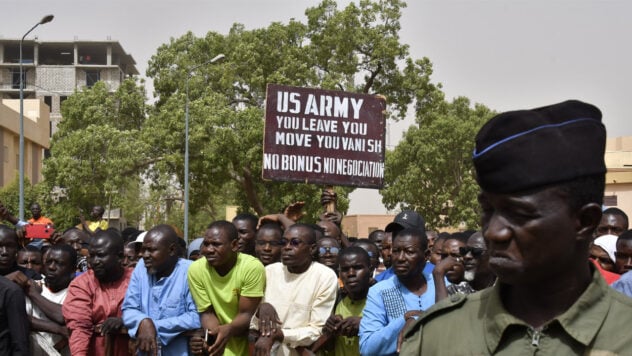
The United States will withdraw more than 1,000 troops from Niger, forcing President Joe Biden's administration to rethink its counterterrorism strategy. In addition, the withdrawal of American troops from this African country will be a strategic victory for Russia, writes The Guardian.
Withdrawal of US troops from Niger
The decision to withdraw troops comes a month after Niger's ruling military junta scrapped a security pact with the United States that had allowed American troops on its soil to help fight jihadist terrorism.< /p>
U.S. officials had hoped that behind-the-scenes talks could salvage the 12-year-old agreement, which was in jeopardy on March 15 when a junta official said publicly that continued U.S. military presence in Niger was “illegal”.< /p>Now watching
America finally admitted defeat after a meeting in Washington this week between Kurt Campbell, Deputy Secretary of State, and Niger's Prime Minister Ali Lamine Zein.
The troop withdrawal, expected to happen in the coming months, will mean the closure of the US drone base known as Base 201 in Agadez in the Sahara, which opened in 2018 at a cost of $110 million .
The base, one of the main US drone installations in Africa, has been used in operations against jihadist groups in the Sahel region and was reportedly the launching pad for a series of deadly strikes against Islamic State terrorists in Libya in 2019.
Niger's relations with Washington have remained strained since July last year, when democratically elected President Mohamed Bazoum was overthrown in a coup. He remains under house arrest, despite American calls for his release.
Russian influence in Africa
Since the coup, Niger's new leaders have sought closer ties with Russia, as have neighboring Mali and Burkina Faso, where Russian military forces are stationed.
Just days after Russian military equipment and advisers arrived in the country, thousands of protesters gathered in Niger's capital, Niamey, last week to demand the withdrawal of US troops.
According to Russian reports, the newly arrived troops were part of Russia's so-called Afrika Korps — a new paramilitary force created to replace the private military company Wagner, which was previously supervised by a war criminal, Russian Evgeniy Prigozhin.
Prigozhin was an ally of Vladimir Putin until he led an unsuccessful uprising against the Russian leadership last year. As a result, exactly two months after his uprising, Prigozhin died in a plane crash. These two months before his death, the mercenary leader offered the services of the Wagner PMC to the leaders of the coup in Niger after they seized power.
American military leaders have warned of the spread of Russian influence in the Sahel, the semi-arid sub-Saharan region stretching from the Atlantic to the Red Sea, and other parts of Africa at America's expense.
Niger is getting closer to Iran and the Russian Federation
Americans raised the alarm when Niger's Prime Minister Lamine Zeine visited Moscow last December to discuss military and economic ties, and the following month traveled to Tehran to meet with Ebrahim Raisi, the Iranian president. < /p>
Senior State Department and Pentagon officials visited Niger earlier this year in an attempt to keep the military agreement in place.
The visit was not a success: Nigerian figures expressed anger over what they said were unfounded American suspicions about negotiations to give Iran access to Niger's uranium resources, which could contribute to the development of Tehran's nuclear program.
As The Guardian notes, the withdrawal of American troops from Niger follows the expulsion of French troops in a coup last summer.

